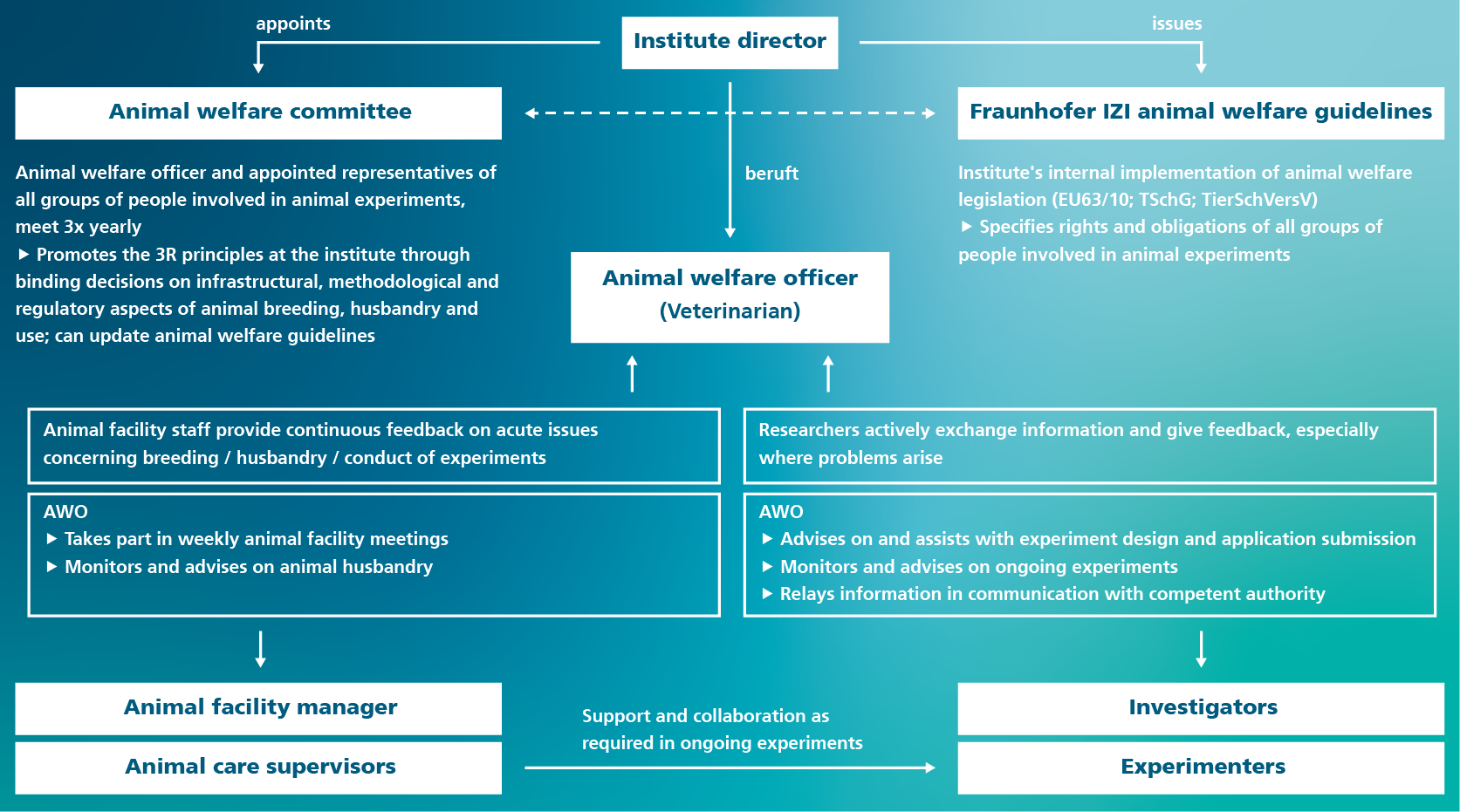Contact Press / Media
Dr. Karoline Möller
Animal welfare officer
Fraunhofer Institute for Cell Therapy and Immunology
Perlickstraße 1
04103 Leipzig, Germany
Phone +49 341 35536-5427

Internal animal welfare guidelines govern the implementation of animal welfare legislation (EU63/10; German Animal Welfare Act (TSchG); German Animal Welfare Regulation Governing Experimental Animals (TierSchVersV)) at the institute. As formal instructions, they are binding for all members of staff at the institute. The guidelines are reviewed at regular intervals, in particular by the animal welfare officers, and adapted to reflect the latest legal regulations and scientific findings as required.
An internal animal welfare committee made up of scientists and animal facility staff supports the work of the animal welfare officer. It confers regularly on all issues concerning animal husbandry, care and experiments conducted at the institute, with the aim of analyzing and optimizing work flows and continuously developing new ways of improving animal well-being. It is able to make binding decisions and thus actively works toward the implementation of the 3R principle (replace, reduce, refine) at the institute.
Three animal welfare officers are employed at Fraunhofer IZI. They all hold respective qualifications in the fields of laboratory animal science and animal welfare and have many years of experience in scientific research and animal testing. The animal welfare officers are responsible for ensuring the observance of all statutory provisions, conditions and requirements in the interests of animal welfare at the institute. In performing their tasks, the animal welfare officers are not bound to specific instructions, meaning they can act autonomously.
The animal welfare officers provide advice on animal welfare to everyone involved in animal experiments. This begins as early as the design phase of an experiment, when a new application is submitted, and goes as far as providing assistance and supervision in ongoing experiments. They also check that the animal experiments are properly documented. Communication with the competent authorities, especially in the case of problems or changes to experimental procedures, is an important aspect of the work carried out by the animal welfare officers. For example, they have to prepare a statement for every request for approval of an animal experiment.
Besides this, the animal welfare officers work closely together with the animal care supervisors and animal facility manager. They advise them on all aspects of animal welfare. This concerns not only how the animals are housed but also how they are handled, as well as matters pertaining to their medical treatment.
Moreover, they are responsible for continuously relaying new and important information to everyone involved in animal experiments at Fraunhofer IZI, for example as part of training events or continued professional development measures.
The animal welfare officers also propose internal measures for improving animal welfare and promote the implementation of the 3R principle (replace, reduce, refine) at the institute, which involves looking at potential, new alternatives to animal testing, for instance.
The 3R principle sets out ethical guidelines for research involving animals. The three Rs stand for replace, reduce and refine. The principle states that animal experiments may only be conducted where no alternatives are available, that only a minimum number of animals may be used in such research, and that experiments must be designed in a way that places the animals under as little stress as possible. The consistent implementation of the 3R principle in all areas of animal research is a prerequisite to the approval of animal experiments by the competent authorities.
The 3R principle also applies to housing conditions and to animal handling. This is why rats are kept in more spacious cage systems at Fraunhofer IZI. Mice are generally handled using the tunnel handling approach, which involves the use of small plexiglass tubes to move the animals carefully in a way that causes little distress.
Consideration is always given to the latest research findings when designing experiments, which helps keep the number of animals used in experiments to a minimum. Extensive research into the available literature is intended to prevent the unnecessary repetition of experiments that have previously been conducted and published elsewhere. A detailed and statistically thought-out experiment design guarantees a high level of quality and significant results, avoiding repeated experiments where possible.
Advanced training courses are offered at regular intervals at Fraunhofer IZI; anyone who plans to work with animals in medical research in the future can take part in a course and earn respective qualifications. Moreover, animal welfare officers and the animal welfare committee are constantly relaying new technical and scientific knowledge that could improve animal well-being to individuals involved in animal experiments.

Submitting an application for animal experiments